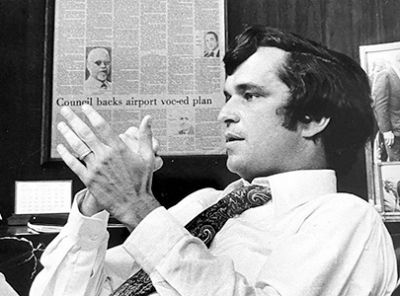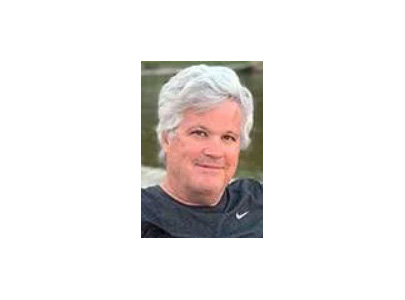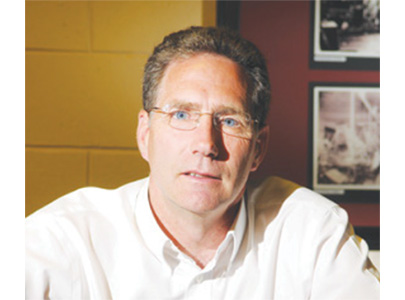Hodding Carter III, former DD-T owner, publisher and editor, has died
Jun 1, 2023

JON ALVERSON
Publisher | Delta Democrat-Times
Greenville High School class of 1953 president, journalist, political activist and former owner of this newspaper, Hodding Carter III has died at 88.
He was born April 7, 1935, in New Orleans, to William Hodding Carter Jr. and Betty Werlein Carter. They moved to Greenville, Mississippi, in 1936 after being recruited by a group of community leaders to start a newspaper that evolved into the Delta Democrat-Times.
His father won the Pulitzer Prize in 1946 for a series of editorials critical of U.S. treatment of Japanese-Americans during World War II.
His mother, from a prominent New Orleans family, was a feature writer and editor who recalled sitting at home with a shotgun across her lap after receiving threats from the Ku Klux Klan.
Carter was the oldest of three sons. His brother, Philip Dutarte Carter, reported for Newsweek and served as publisher of the Delta Democrat-Times and Vieux Carré Courier as well as a financier of Gambit, a New Orleans weekly. Another brother, Thomas Hennen Carter, died at 19.
Hodding Carter III attended Phillips Exeter Academy in New Hampshire before graduating from Greenville High School in 1953. He graduated from Princeton University and later married Margaret Ainsworth Wolfe. They had four children before divorcing in 1978.
Carter then married Patricia M. Derian, a veteran of the Civil Rights Movement, who sought to transform U.S. foreign policy as President Carter's assistant secretary of state for human rights and humanitarian affairs.
Former employees of the newspaper in the 1960s and 1970s remember Carter as a tough-but-kind manager who knew how to throw a party.
Lou Powell worked as a copy editor from 1968-1972 when Carter was spending much of his time out of Greenville pursuing political issues.
“When he’d come back to town, he’d come into the newsroom with a fistful of tearsheets covered in red grease pencil,” Powell said. “He didn’t like it when I put the invasion of Cambodia on an inside page instead of the front of the newspaper.
“But at the same time, Hodding did not hold a grudge at all. He was very tolerant, and we made a lot of mistakes,” Powell said.
He also remembers Carter’s reputation for tightfistedness.
“He paid pretty low rates, but we were young and mostly straight out of college,” Powell said.
Ed Williams, who worked at the paper from 1968-1970, remembers the pay, as well.
“He told me I should come work at the paper and make a little money before going to grad school,” Williams said. “I kidded him for the next 50 years about how little money it was.”
Carter gave Williams’ induction speech to the North Carolina newspaper Hall of Fame after a long career as editorial page editor of the Charlotte Observer.
“It (Greenville) was an exciting place to be,” Williams said. “We’d go to this juke joint outside of town called Tilly’s, and he’d ask everybody what they thought of the paper. Sometimes I didn’t think we’d get out of there alive.”
“He was a prince,” Williams said. “He was good-looking, smart, talented and well-connected.”
Ella Cannon worked at the paper from 1976 until 2016 and remembers Carter as being a good man to work for and the parties.
“He could throw a hell of a Christmas party,” Cannon said. “The parties were always in the back and, man, we had a ball.”
Penny Weaver, who worked at the paper from 1970 to 1973, remembered the parties as well but also talked about more recent gatherings hosted by the Reed family when Hodding had a birthday in 2010 and at the burial of his second wife in 2016.
She also remembers the advice memo he wrote to her when she took the job at the paper.
The memo said there are three things necessary to being a good journalist:
Accuracy. “You have to be accurate. If you can’t spell somebody’s name right, they aren’t going to believe anything else you say.”
Clarity. “You have to report the news so it can be understood.”
Good writing. “You need some flair with words, but it is the least important. Don’t let it get in the way of the other two.”
Weaver echoed the sentiments of others who worked at the paper in that time.
“It was an exciting time to be in Greenville,” Weaver said.
Longtime friend Clark Reed said Greenville isn’t now the same place as it was then.
“Everybody wanted to be here,” Reed said. “Nobody would have thought to move to Oxford.”
Reed said he and Carter, although political opposites, got along well and often brought the glitterati of the political world to Greenville.
Hodding left Greenville for Washington in 1977.
He had been co-chair of the Loyalist Democrats, a racially diverse group that won a credentials fight at the 1968 Democratic National Convention in Chicago, unseating the all-white delegation by Mississippi's governor, John Bell Williams.
His campaign work in 1976 for Jimmy Carter (no relation) helped secure him a job as assistant secretary of state for public affairs. It was in this role that he was seen on television news during the 444 days that Iran held 52 Americans hostage.
When Ronald Reagan was elected to the White House in 1980, Hodding returned to journalism as president of MainStreet, a television production company specializing in public affairs programs that earned him four national Emmy Awards and the Edward R. Murrow Award for documentaries.
Hodding appeared as a panelist, moderator or news anchor at ABC, BBC, NBC, CNN and PBS. He also wrote op-ed columns for the Wall Street Journal and other newspapers. He served twice on the steering committee of the Reporters Committee for Freedom of the Press.
Carter later was named the John S. Knight Professor of Public Affairs Journalism at the University of Maryland. In 1998, he became president of the John S. Knight and James L. Knight Foundation based in Miami, Florida.
After leaving the foundation, he began teaching leadership and public policy at the University of North Carolina at Chapel Hill in 2006. He wrote two books, “The Reagan Years” and “The South Strikes Back.”
The Associated Press contributed to this report.









